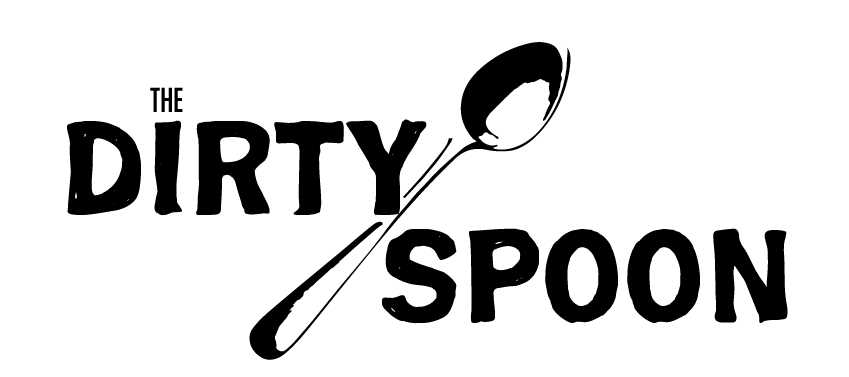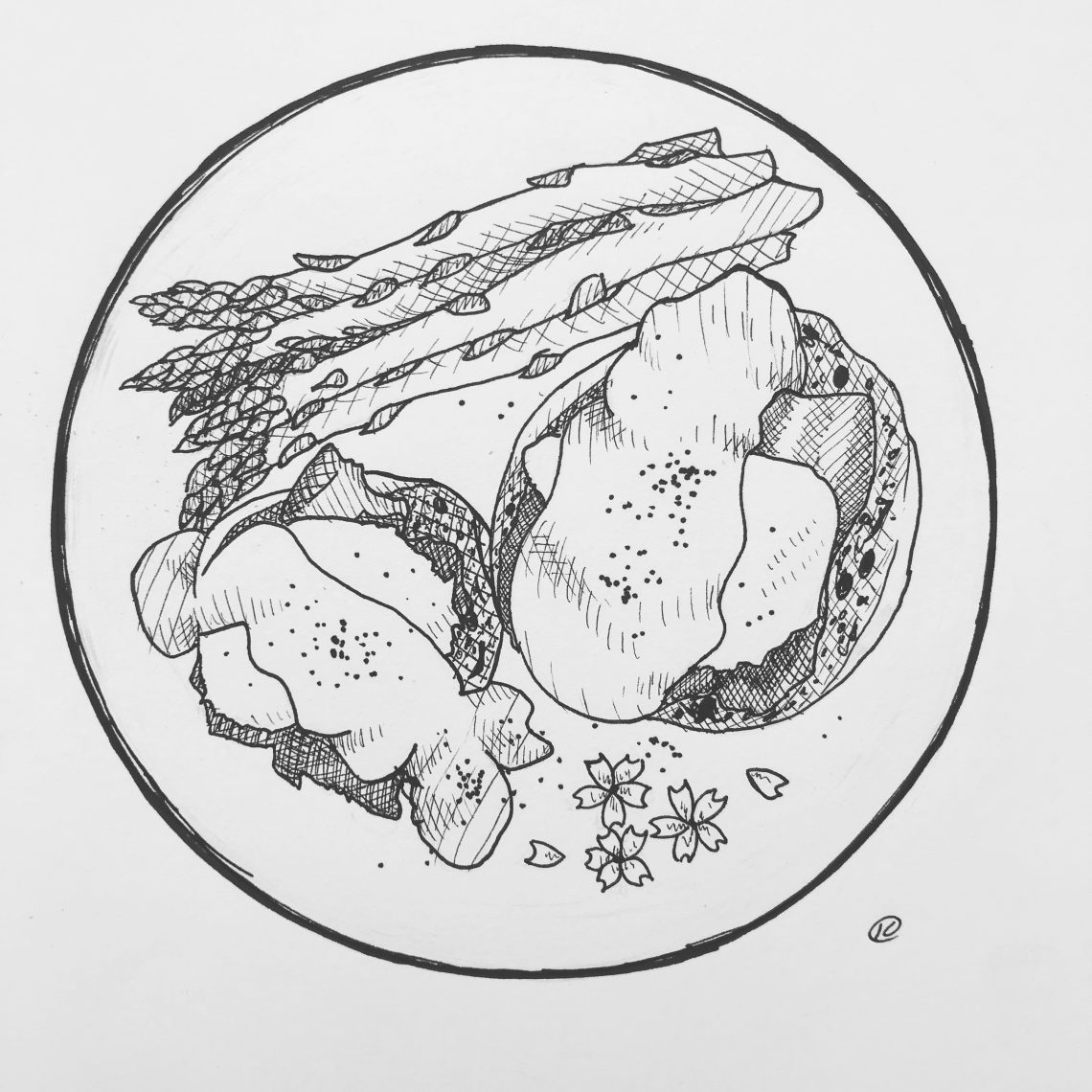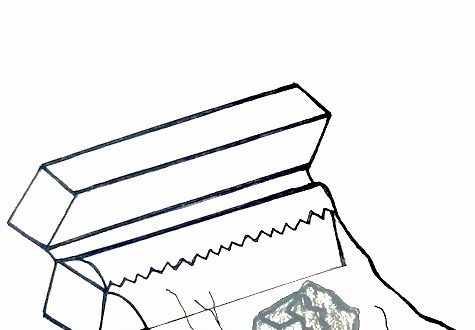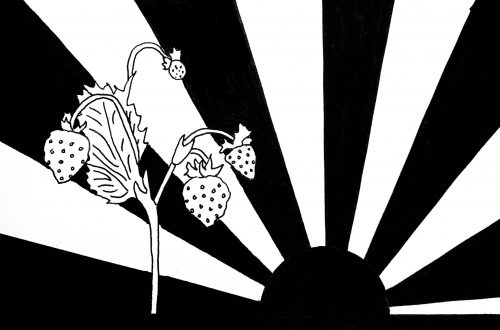by Annilee Newton
Art by Kelly Minear
Annilee’s essay, “Coming Apart,” appears on The Dirty Spoon Radio Hour in episode 5, which aired September 7, 2018.
Nesbit, Mississippi
1990
It’s Mother’s Day, and Dad is in the kitchen making eggs benedict for Mom, who is still upstairs asleep in bed. The entire house smells like coffee and frying Canadian bacon. The sun is streaming through the windows at an early morning angle, and the dust from the carpeted stairs is revealed in the light, floating leisurely in all directions as if gravity didn’t exist.
The breakfast smells draw my sister Hillary and me from our bedroom. Still in our pajamas, we each climb onto our bar stool around the kitchen island. It’s an early Sunday morning in May, the best time to go out and look for spider webs pearled with dew to pick apart with a stick. Also the best time to pluck the wild purple violets on the hillside by the firewood stack and slowly tear the flowers apart into precise pieces. But this morning, Dad is cooking breakfast in the kitchen, and he is happy. He is whistling an ancient Confederate battle song, and his big hands are slicing a lemon in half. As his knife bites into the peel, bits of fragrant oil erupt into the steam from Dad’s coffee. He pours the lemon juice into a saucepan, and furiously whips the contents. Focused, intent, and bent over the stove to avoid hitting his towering head on the light in the middle of the kitchen.
He stops.
“Do you want orange juice, girls?” Dad asks.
Hillary and I nod, and Dad reaches into the refrigerator and grabs the orange juice. It’s reconstituted orange juice from a frozen can, and it’s in a plastic pitcher. He also grabs a dark glass bottle. Dad pours two glasses of orange juice for us. Then he peels silver and gold from the mouth of the glass bottle and twists the top. A popping and fizzing, and dad pours gold effervescent champagne into a cut wine glass. I watch the bubbles racing to the surface of the glass until they become obscured by condensation.
“Can I taste it, Dad?” I ask.
“Alright, just a little taste.” The sparkling wine shoots up my nose before it’s even in my mouth. I touch my lips to it, and then hand the cup to Hillary.
“Even worse than coffee,” I tell her.
Dad is constructing Mom’s breakfast onto a white ceramic plate. The two halves of an English muffin, side by side. A slice of Canadian bacon on each half. A poached egg over each slice of Canadian bacon. A spoonful of rich, buttery yellow sauce over each egg. Sliced canned mushrooms heated in the microwave sprinkled over the hollandaise sauce. Canned asparagus on the side of the plate dressed in a more modest drizzle of sauce. All of the different ingredients from different pans and plates come together.
“And that?” I ask, pointing at the fluffy butter-colored sauce. “Can I try that?”
“No way. I don’t think you’re going to like it, Annie. This is grown up food,” Dad says.
“Please? How do you know I won’t like it?”
“Well, I guess I don’t know.” Dad dips a teaspoon into the pot of hollandaise sauce, and the sauce clings to all sides of the spoon. “Here you go.”
I lick the spoon.
In the same way that color can set a part of our dreams on fire and ensure that we remember it in the morning, that first taste of hollandaise sauce lights this moment in my memory. Without the taste of hollandaise, this memory would ebb away and be lost in the flow of my days of living. Instead this scene, this day, lasts inside of me and makes up a part of the landscape of myself.
“Do you like it?” Hillary is asking.
I’m not sure if I like it or not, but I nod. It is just so much more of a taste than the tastes of my favorite childhood foods: chicken and noodle soup, macaroni and cheese, pork chops.
I hand Hillary the spoon. She shakes her head.
“What about flowers?” Hillary says.
“We don’t have any,” Dad says.
Hillary and I race outside in our bare feet to harvest violets. We also rip up a few handfuls of moss, some larger tiered purple bell flowers, and the tiniest little white and pink four-petaled blossoms, even smaller than a pebble.
We race back to the kitchen and place our blossoms around the white plate, the cup filled with black coffee, and the champagne glass.
Dad picks up the tray. “I don’t know if this is going to work. Can you help me girls?” He hands the black coffee to Hillary and the champagne to me. Dad has muddied the champagne bubbles with orange juice. We each carry our cups in both hands, and we follow Dad to the stairs.
Our staircase has twelve stairs of brown carpet. Ten of the stairs climb up the front side of the house like a spine to the second story, and two jut out from the wall. There is a square platform area under a window, between the second and third stairs. Hillary and I take every stair slowly, all of our attention on not spilling the liquid from our glasses.
And then Dad opens the door. “Happy Mother’s Day!” Dad says.
“Happy Mother’s Day, Mom!” Hillary and I say before we relinquish our cups into Mom’s hands. Everyone is smiling. And then the memory goes dark, like a curtain dropping on a perfect discrete scene.
***
When Dad made hollandaise sauce, he was making an emulsion, an implausible mixture of two immiscible substances. He was mixing a polar liquid with a non-polar liquid by adding lemon juice to melted butter. Polar and non-polar liquids do not mix; they cannot mix. If you whisk water and oil together, it will seem as if the two substances have mixed. The water droplets will be suspended temporarily in the oil, and the mixture will seem uniform. But it only seems uniform— after a few minutes, the water and the oil will separate again. The oil is hydrophobic: it fears the water.
The egg yolks that Dad whipped into the butter and lemon juice worked as an emulsifier, the missing link that allows the oil and water to mix. The egg yolks contain lecithin, a molecule that has a water-loving end and a water-fearing end. The water-loving end of the egg yolks binds with the lemon juice, and the water-fearing end binds with the butter, and then you can just add a little bit of heat and the two unmixable liquids become one. The oil and water come together, and they stay together.
Nesbit, Mississippi
1995
We are waiting around a silent dinner table for Dad to come home. All of the food is ready. Mom has made steak and Vicky rice. Vicky rice is also made using a polar liquid and a non-polar liquid, but with no emulsifier.
Earlier, Mom had put one cup of white rice, two cans of beef consumé, and one can of drained, canned mushrooms into a casserole dish and baked it at 350 degrees until the rice absorbed all the consumé and is coated with the melted butter. This recipe is Dad’s recipe, but Mom makes it even more than he does these days. This is the dish she brings to the church potluck every fourth Sunday. Dad doesn’t go to church.
This is the dish she brings to the church potluck every fourth Sunday. Dad doesn’t go to church.
Moving clockwise around the kitchen island there is an empty stool with a dinner plate loaded down with food in front of it, then Mom sitting on her stool staring at the front door, then me, then Hillary, then Josh’s empty seat. Our brother Josh is eight years older than Hillary and me. He is in high school, and he rarely eats dinner at our house anymore. He calls on the landline and tells Mom that he’s going to be eating dinner next door, or at one of his baseball teammates’ houses. It seems like he just goes from house to house on a kind of schedule. Once every month or so, he’ll eat at home, but it’s usually when Dad’s out of town on business. My dad is not Josh’s dad.
Hillary and I are looking down at our plates. It’s summertime, and we are bigger. Now I can race up the stairs to my bedroom two at a time, and I am constantly tripping over my lanky legs. The summer cacophony of crickets pours through the screen door, and every once in a while, a late lightning bug flashes on the porch.
Headlights flare in through the front windows, and soon the heavy wood front door creaks open and slams shut. Dad’s finally home from the golf course. But Mom isn’t happy to see him.
When Dad walks into the kitchen, I can smell the Coors Light and sweat. He walks to the refrigerator, grabs a beer, and then walks over to Mom. “Hey, honey,” Dad says, and bends over to kiss her on the cheek. But Mom turns away.
“We can eat now, girls,” she says. Hillary and I pick up our forks. We still don’t eat.
Dad sits down in his place at the table. He loves steak. “Well, what do we have here? This looks pretty good. Did you sear the sirloin at high heat first?”
“What does it even matter? Everything’s cold,” Mom says.
“What do you mean what does it matter? Of course it matters. It always matters,” Dad says.
“No, apparently it doesn’t matter. Being here, being home, with me, with your children. None of it matters to you. Why do I even bother to cook? I should never have cooked dinner.”
“I should never have had children with you,” Dad says. Mom is crying. She walks up the twelve stairs and slams her bedroom door shut. Dad drinks down the rest of his can of beer without coming up for air, smashes it in his hands, and walks back out the front door.
Hillary and I are alone at the table. We start eating the cold Vicky rice and feeding pieces of gristle to our dog, Trixie, under the table. There is no one left to see us and scold us.
***
Eggs are a difficult ingredient to work with. I have this on good authority from Josh, my brother who grew up to become a chef, and Julia Child, my father’s favorite cook. According to Josh, the two most difficult ingredients to master are eggs and potatoes. If you can learn to exploit all the different manifestations of the protein in eggs and the starches in potatoes, you are on your way to becoming a classically trained French chef. Julia Child agrees. In her book Mastering the Art of French Cooking, she writes, “We feel it is of great importance that you learn how to make hollandaise by hand, for part of every good cook’s general knowledge is a thorough familiarity with the vagaries of egg yolks under all conditions.”
To make hollandaise sauce, there must be heat, but there mustn’t be too much heat. When Dad taught me how to make hollandaise sauce, he always monitored the process. He would fiddle with the heat, tell me to take the pot off of the burner, add more lemon juice. Small things that didn’t seem to matter until I was alone in the kitchen trying to make my own hollandaise sauce and failing.
When the hollandaise sauce is exposed to too much heat, it curdles. It breaks apart into pieces with different composition. The sauce separates. There’s only a tiny window after emulsification and before curdling when the sauce can come together as a homogenous mixture.
Hattiesburg, Mississippi
2007
I am in college, and I am making eggs benedict for my birthday brunch. It’s just me and a boy that I love in our downtown loft apartment. The mushrooms— fresh this time— are sliced and sautéed in butter, the asparagus is gently browning into crisp nuttiness in the oven. The eggs are poached, the lemons are squeezed, the butter is clarified. And I am whipping the contents of the saucepan like a madwoman.
The moment of emulsification never seems to come. One minute the butter and the eggs are separate, the next minute they are curdled. That moment of becoming one cohesive, unified sauce doesn’t ever happen.
One minute the butter and the eggs are separate, the next minute they are curdled. That moment of becoming one cohesive, unified sauce doesn’t ever happen.
I turn off the stove. I look down at the pot. The knobby contents seem to congeal and cloud over even more as the heat leaves. The boy comes over to look into the pot.
“Is that what it’s supposed to look like?” he asks.
I shake my head. “Not even close.”
“Well, baby, let’s just go out to eat. I’ll buy you breakfast somewhere.”
I shake my head again. “You know, I think I just need a minute.” I pick up my glass of champagne and the rest of the bottle and take it out into the concrete courtyard. I bask under the late August sun, and feel it radiating onto me from every direction. The noon train to New Orleans shrieks by, the cars clanging together as it comes to a stop at the depot down the road.
Three months later I find my own apartment and move out. The boy that I love becomes the boy that I loved, and we separate.
***
I took a cooking class in college, and one day my cooking teacher told me to burn the rue, a flour and butter mixture that can become the basis for milk gravy or gumbo.
“Excuse me?” I said. “You want me to destroy this?”
“I sure do,” she said.
“But, why?” I asked
“It’s the only way you’ll be able to understand all the stages: the peanut butter stage, and the chocolate stage, and the burned trash stage. You need to be able to see the progression of the effects of heat on the rue before you can master it.”
“I’ve never ruined any food on purpose before. Only by mistake.”
“There are no mistakes in the kitchen, Annie. Only learning experiences.”
Livingston, Texas
2010
It’s Christmas, and I am helping Dad cook hollandaise sauce for the Christmas dinner. He and Mom are both divorced and remarried to new people. Dad changes up his Christmas menu every year—sometimes it’ll be a German Christmas dinner, sometimes Italian. This year, it’s steak and asparagus with hollandaise sauce. He is outside grilling enough steaks for twelve people, and I’m inside making the hollandaise sauce.
I am being very, very careful. I am hoping that I have learned from my past mistakes. The heat is on low, and I am violently whipping the contents of the saucepan. I whip and whip and whip, and nothing is happening. Nothing happening is better than curdling, but I am still just staring down at a pot of raw egg yolks and butter.
After a quarter of an hour or so, I take the pot completely off the heat and ask Dad for help. He looks down into the pot, cranks up the heat to medium, and puts the pot right down on the burner.
“Wait! Isn’t is going to curdle? That has to be too much heat.”
He shrugged. “We’ll see.” The mixture began to puff up and lighten in color. After it had almost doubled in size, Dad turned off the burner and moved the saucepan to a pot holder. The hollandaise was emulsified.
***
To analyze is to break down a thing or an idea into smaller parts in order to try to come to a deeper understanding. Like when I was a little girl, tearing apart the violets by the firestack. I didn’t just rip them into shreds—it wasn’t an act of destruction. I slowly plucked off each flower and leaf until the structure was naked, then I used my thumbnail to slice open the little package filled with clear particles of living sand granules. I tore apart the violet to understand how it worked.
But did I really learn how the flower worked? What do I understand about a flower now that I know what the insides look like? What if I didn’t learn anything at all from burning the rue? And I just keep tearing apart flowers and burning rue forever? Surely growth isn’t something that we just get by virtue of being alive.
Surely growth isn’t something that we just get by virtue of being alive.
Analysis is easy. Tearing something apart is as natural as breathing. It’s the bringing separate things together that is hard, maybe impossible. Synthesis is the problem of life. Or maybe it’s just my problem.
Houston, Texas
2013
Here I am, with another boy that I love, making him eggs benedict again. This time I’m making it for his birthday brunch in the kitchen he shares with his two roommates. He has never eaten eggs benedict before.
“You have to understand—it might not turn out. I’ve ruined more hollandaise sauces than I’ve cooked successfully.
“I’ll help you,” says this boy. “Let’s give it a try.”
So, he’s in the kitchen beside me, snapping the wooden ends off the asparagus and slicing mushrooms. I tell him all about eggs and coagulation and emulsification, and he fills up my champagne glass. I clarify the butter and start to think, what does it matter if it curdles? So what if it doesn’t work out? We are here, at this moment, cooking together, drinking together.
I start to add the hot clarified butter to the lemon juice and egg yolk in a saucepan, and the boy that I love stirs. Slowly, I trickle in the butter and put the saucepan on low heat. I watch as the color starts to lighten, and the mixture puffs up. I turn off the heat and place a teaspoon in the sauce. The sauce clings to all sides of the teaspoon. It’s perfect.
“Wait, wait, just wait a minute,” I say to the boy.
“What? Are you afraid I won’t like it?” he asks me.
“No. I’m afraid you will like it, and you’ll love me forever, even if you shouldn’t.”
He looks up at me. “I’ll risk it,” says the boy.
I hand him the spoon.
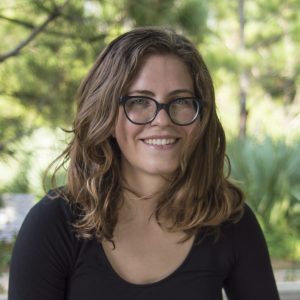
Annilee Newton is a Houston-based freelance writer and MFA Nonfiction candidate at Lesley University in Cambridge, Massachusetts. “Coming Apart” is the first in a series of essays exploring food, memory, and identity. You can learn more about the project at www.annileenewton.com.
